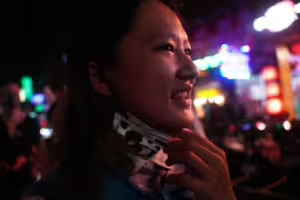Reporter/Nienyun Huang
“MDD, Suicide ideation,”a 22-year-old transgender woman posted a sobbing medical diagnosis on her Instagram.
Kianna Chiu thought it would be the start of her happy life with a new identity she has longed for. Instead, it may now have become the beginning of a haunted remorse for the rest of her life.
More than two years after Chiu changed him into her, that deep, long-buried emotion appears to finally erupt recently that can be barely contained. “It was because of the school work and internship at the hospital clinic,” she revealed in her post. Chiu was receiving mental health treatment at a safety-check clinic of the local hospital, to keep her from committing suicide.
She’s now taking almost 20 pills a day to counterbalance the waving depression to stay alive.
LGBTQ+ and conundrum in the limelight
Despite being the first country in Asia that legalizes gay marriage in 2019, Taiwan’s LGBTQ+ community is still facing discrimination and oppression.
A recent survey conducted in 2023 painted a worrisome picture of a hostile workplace for them either getting bullied or treated derogatorily once coming out of the closet. It means that even in the more liberal Taiwan, a considerable number of these sexual minorities may still seek to hide their sexual identity.
Many members of the LGBTQ+ community have a higher risk of mental illnesses as they experience trauma or misunderstanding from their kinship. This misunderstanding or hostility leads to a higher risk of mental illness for many members of the community, experiencing severe traumas.
“The necessity of social support for transgender people in China”, a research article published on the internationally renowned medical journal THE LANCET, calling for greater care for transgender people in China.
According to this survey of 1,309 Chinese transgender people, 56.4 percent of them had suicidal thoughts and 16.1 percent had attempted suicide during their lifetime, signaling the urgency of this issue.
On top of the mental instability, many studies have indicated a number of risk factors for the high suicide rate and suicidal behavior of transgender individuals. Lacking family support is atop the list. And 62% of the transgenders fail to get along with their family members, some even with connections totally severed.
That is exactly what has happened to Chiu, who completed transgender surgery in July two years ago in Thailand. Back then, he defied all disapprovals of his family and friends, bull-headedly going for the life-changing surgery.
Watershed
At the beginning of the spring semester 2021, Kianna joined the NTU Bondage and Discipline, Dominance and Submission, and Sadomasochism or BDSM club. After At that time, she had not yet undergone gender reassignment surgery but was already experimenting with femininity, taking estrogen, and growing her hair long, said Coretin Hsieh, Kianna’s friend from the student club.
When Kianna returned in July to campus after the surgery, she encountered a number of physical chores, such as the need to borrow a club office for post-surgical vaginal dilation to prevent adhesion.
“I could sense, however, that she felt more comfortable and liberated psychologically,” added Hsieh “Overall, she seemed to be getting along with her new body better.”
Nevertheless, this seemingly stable, enduring harmony melted down almost two years after the surgery.
Trauma At Early Ages

Chiu grew up in a traditional patriarchal Chinese family where her mother stays home to raise children and cares for her husband. A former swimming coach, Chiu’s father extols every symbolic thing about men, masculine and solemn. Growing up, he naturally became part of the swimming team and trained for competitions, which he later described as a painful memory.
“My father would use a bamboo stick to whip his students when they made a mistake,” she said.
He developed his sexual identity as a girl over his given sex when he was only five and was disgusted when secondary sexual characteristics started to show during her puberty.
“I puked when I looked at the thing, and I wanted to get rid of it,” she said. “I even looked up how to become a eunuch, at that time I didn’t know the Chinese Ching dynasty had doomed.”
When he was in middle school, he started dating a schoolmate. Their love sprouted when they changed swimsuits together before the swimming class at school. The passion after seeing each other nude exploded and they sneaked into the school library and had sex almost every school day, he was preoccupied with this relationship until a month into their young love, the tragedy happened.
“One time we agreed to meet at the same place, and when I arrived, I found another student. I was very short in junior high school, short of 150 cm tall. I was forced to give him oral sex, and my boyfriend, who I thought would come to my rescue, came to videotape the whole process.”
Chiu said, ever since he completed videotaping, the dulcet dynamic went awry. The young man he once adored forced her to have sex whenever he wanted.
Only the day before graduation, the then 160 centimeters Kianna freed herself by smashing the video-stored phone, leaving her stunned boyfriend in the bathroom.
Kianna saw university as a haven that allowed her to begin the long road of healing.
Redemption from friends

“Since I got into university, no more academic pressure from my mom, and having more free time has made me realize I can’t sit down and need instead to focus on things. More accurately to say, I started to cry when I reflected on myself,” she said.
Aided professionally, she was diagnosed with post-traumatic stress disorder or PTSD. But she decided to face and find ways to overcome them this time, instead of running from it again.
Having encountered these traumas, she came to realize she wished to be a transgender lesbian and decided to seek external peer support. She partook in varying university student associations and worked part-time at varying positions, all of which assured her that “the more I share about myself, the more relieved I would become.”
“I become more confident and ready to confront my family to get out of the closet.”
After preparing herself for a while, she thought to reach out to her family and tell them the truth of her identity that has been hide long enough. She planned to start with her grandmother who as she recalled is the most supportive person in the family then to her mother, but none of the plans went as her wish.
“My grandmother, from my mother’s side, is the first to know that I’m not ‘normal’ in the family. She still thinks that if I am a self-identified female, my wanting to be with a female is caused by impulses and stresses,” she said. “But we were close.”
She organized a meal with her mom, expecting her mom to support her as she supported gay marriage during the 2018 referendum through her actions and evidence.
“I was raped, but my mom said that I deserved it”
While ultimately showing support, her mother rebuked Chiu’s conduct during their meeting fraught with hesitation, confusion, and anxiety. Chiu painfully recalled her mother’s reprimand: “If you like a girl, why do you want to be a girl just to like a girl? You deserved to be raped for your ‘wayward’ behavior.
“The orthodox thought put me in a position in which I’m no victim. But I think it’s important for her to know that,” she added.
“As for my dad, we never really sit down and talk. He’s like I will support your living expenses, but leave me alone.”
No matter whether it’s the decision to come out of the closet or Estrogen, testosterone blockers, and progesterone, the medication she took for the post-surgery treatment, Kianna acknowledged the risk behind it with significant side effects.
“In the transgender community, we have one or two friends succumb to mental illness every month,” she said, “but I’m willing to take the risk and complete myself as a real woman.”
Chiu herself is fighting hard to get by.



